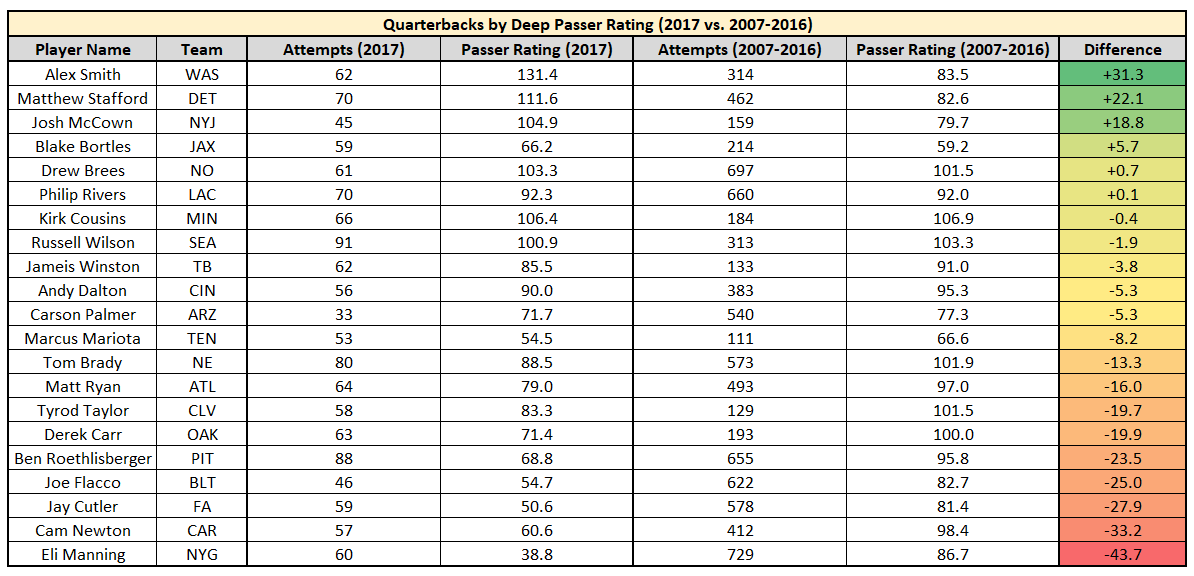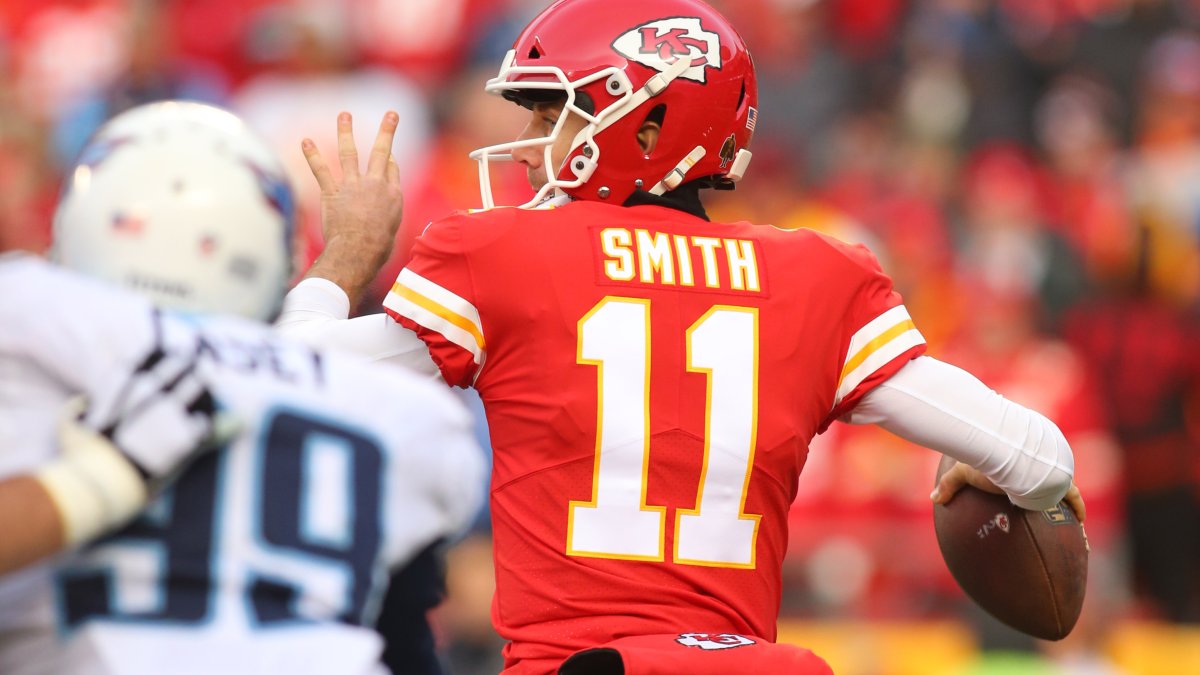(Metrics that Matter is a regular offseason feature that examines some aspect of fantasy through a microscope to dive into the finer details.)
There’s a million things I love about football. I love the big clock-cleaning hits. I love watching running backs stiff-arm and juke defenders on their way to a big gain. I love a trash-talking cornerback shutting down a wide receiver for an entire game. I even, sometimes, enjoy special teams. Though, I’m confident, nothing is more exciting or demoralizing than the deep ball — watching a quarterback drop back, throw deep, and complete a pass to a receiver far down the field.
It’s my favorite thing to watch in football, but I’m curious: Who are the league’s best deep-ball quarterbacks, and what does that mean for fantasy?
In the PFF-era (2007-2017), passer rating has a year-over-year correlation of 0.34 among all quarterbacks to attempt at least 250 passes in consecutive seasons. Meanwhile, deep passer rating has a year-over-year correlation of 0.12 among all quarterbacks to attempt at least 30 deep passes in consecutive seasons.
What does this mean? Well, basically, deep passer rating isn’t very stable or predictive year-over-year, at least relative to raw passer rating. I think there’s some important signal in the noise, especially when looking over a larger sample, but perhaps, more importantly, we can use deep passer rating to help pinpoint outlier seasons where a regression closer to the mean should soon follow.
If you’re an Elite subscriber you can access this data here. We define a “deep pass” as any pass attempt where the ball travels 20-plus yards through the air. Since we already established this is better at spotting outliers, I wanted to contrast a quarterback’s 2017 deep passer rating with their passer rating in all previous seasons within the PFF-era. Here’s the chart:

Who stands out?
Alex Smith, Washington Redskins
Immediately we’re drawn to Smith’s very outlier-ish 2017 season, where he led the league and posted a 131.4 deep passer rating (31.3 points higher than his prior PFF-era average.) For perspective, his deep passer rating of 131.4 ranks second-best of any QB this past decade. Not only was efficiency at an all-time high for Smith, but so was the number of deep passes he attempted. He attempted 62 deep passes last season, while his previous high was 54 in 2006. This helped Smith hit a new career high in fantasy points per game with 20.0, which ranked third among quarterbacks and was 4.5 more than his preceding three-year average.
It’s troubling, though, to consider that 38.7 percent of Smith’s passing production in 2017 (in fantasy points) came on deep passes. This was also the second-most by any quarterback this past decade. I’m sure a significant reason for the uptick in efficiency was Tyreek Hill, who was also our most-efficient deep ball receiver last season (138.9 deep ball WR rating). Or maybe it was brilliant scheming by the coaches, considering Travis Kelce ranked right behind Hill in deep passer rating when targeted (137.9). Needless to say, I’m projecting a significant regression to the mean for Smith, considering how lackluster he was in this department in every other year of his career. Still, ADP (QB20) may have overcorrected following his move to Washington, and he may still prove to be a value.
Matthew Stafford, Detroit Lions
Josh McCown, New York Jets
Like Smith, we can probably expect a regression to the mean for both Stafford and McCown, but far less so when considering the talent each is asked to throw to. Stafford’s deep passer rating likely suffered earlier in his career, when his only legitimate receiving option was a triple-teamed Calvin Johnson. Now, he has an impressive trio of receivers in Marvin Jones Jr., Golden Tate, and rookie Kenny Golladay. Jones is one of only two wide receivers to rank top-10 in deep-ball WR Rating in each of the past two seasons and should continue to bolster Stafford’s deep ball efficiency. Similarly, McCown benefited from the emergence of Robby Anderson, who ranked third in deep fantasy points last season.
Eli Manning, New York Giants
Over the last three seasons, of 34 qualifying quarterbacks in each season, Manning ranked 34th, 28th, and first in deep passer rating. Manning definitely struggled after losing Odell Beckham Jr. and Brandon Marshall to injuries last season, but perhaps this is instead a sign that he no longer has the arm strength he once did. I want to project a regression closer to the mean, but at age 37 I’m pessimistic, even with the coaching upgrade to Pat Shurmur.
Cam Newton, Carolina Panthers
Behind Manning, Newton looks like the quarterback most likely to positively regress in deep passing efficiency next season. His 60.6 deep passer rating in 2017 is 33.2 points below his prior career average. I’m a little more bullish for Newton’s prospects than Manning’s, however. Newton did well throwing to Ted Ginn Jr. earlier in his career, but the team lacked a speedy deep threat last season. Perhaps the acquisition of Torrey Smith (career 101.9 deep-ball WR Rating) can help lift Newton to prior heights.
Dak Prescott, Dallas Cowboys
Over the past two seasons, among all quarterbacks with at least 600 attempts, Prescott ranks third in deep passer rating, but last in percentage of targets thrown deep. The acquisition of Allen Hurns, who ranks 20th in deep passing yards since entering the league, might mean more deep pass attempts next season, but it’s not clear that Prescott’s impressive efficiency numbers might remain constant with more volume.
Marcus Mariota, Tennessee Titans
Mariota's career 62.7 deep passer rating ranks a lowly 47th of 63 qualifying quarterbacks in the PFF era. This could be a product of a poor receiving corps for most of his career, or perhaps this is just an area where Mariota struggles.
Kirk Cousins, Minnesota Vikings
Tyrod Taylor, Cleveland Browns
The answer to our original question, who is the league’s best deep passer, is Aaron Rodgers. I think this comes as little surprise, but there were a few unlikely names just behind him. Since 2007, of 63 qualifying quarterbacks, the top-eight quarterbacks in deep passer rating are: Rodgers, Cousins, Andrew Luck, Tony Romo, Taylor, Russell Wilson, Drew Brees, and Tom Brady. Cousins likely benefited from throwing to DeSean Jackson (who we highlighted here), throughout the majority of his career, but this ranking is especially interesting to note as he moves to Minnesota. Adam Thielen ranked first in deep-ball WR Rating in 2016 and Stefon Diggs ranked third in 2017. Taylor has been excellent when throwing deep throughout his career, and now receives a significant upgrade in wide receiving talent, moving from WR1 Zay Jones in 2017 to Josh Gordon in 2018.



 © 2025 PFF - all rights reserved.
© 2025 PFF - all rights reserved.